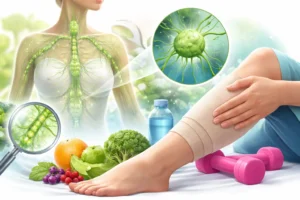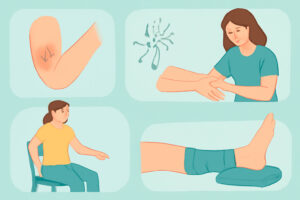Lymphedema is a chronic condition affecting millions worldwide, yet it remains relatively unknown. This article delves into the importance of lymphedema patient advocacy, particularly focusing on how World Lymphedema Day serves as a crucial platform to raise awareness and improve the quality of life for those affected. We’ll explore the condition itself, the significance of this dedicated day, and actionable steps for getting involved in advocacy efforts.
What is Lymphedema?
Lymphedema, often spelled lymphoedema, is a chronic condition characterized by swelling, typically in the arms or legs, caused by a blockage in the lymphatic system. This blockage prevents lymph fluid from draining properly, leading to a build-up that results in swelling. The lymphatic system, a crucial part of the immune system, plays a vital role in fluid balance and fighting infection; therefore, its dysfunction can have significant health implications.
Causes and Risk Factors
Lymphedema can arise in different ways. It may be primary, stemming from genetic factors that influence the lymphatic system’s development. Alternatively, it can be secondary, developing due to damage to the lymphatic system from various causes. Some of these causes include:
- Cancer treatment, especially when lymph nodes are surgically removed or exposed to radiation.
- Infections, obesity, and injuries that inflict damage to the lymphatic vessels.
Understanding these causes is essential for prevention and early intervention.
Symptoms and Diagnosis
Symptoms of lymphedema can vary but commonly include swelling in the affected limb, a feeling of heaviness or tightness, aching or discomfort, and skin changes such as thickening or fibrosis. Early diagnosis is crucial for effective management. Diagnosis typically involves a physical examination and may include imaging tests such as lymphoscintigraphy or magnetic resonance lymphangiography (MRL) to visualize the lymphatic system. Consulting a healthcare professional is vital for an accurate diagnosis and a personalized treatment plan.
The Significance of World Lymphedema Day
History and Purpose
World Lymphedema Day, observed annually on March 6th, serves as a global platform to raise awareness about lymphedema and the challenges faced by patients with lymphedema. The day was established to unite patients, caregivers, healthcare providers, and advocates in a collective effort to educate the public, promote early diagnosis, and improve access to better care and treatment options. It’s a crucial opportunity to highlight the need for medical research and improved public health initiatives.
Global Initiatives and Events
On World Lymphedema Day, various global initiatives and events raise awareness about lymphedema. These include educational webinars, conferences, and local support group meetings. Many organizations share educational content on social media to spread knowledge about lymphedema and its management. [Insert Internal Link] These efforts aim to empower patients with information and connect them with resources and support networks.
How to Get Involved
There are numerous ways to get involved in raising awareness about lymphedema and supporting patients. One can participate in local events, share information on social media, or volunteer with lymphedema advocacy organizations. Another crucial aspect is to support medical research and advocate for policies that improve access to lymphedema treatment and care. By becoming an advocate, you can make a significant difference in the lives of lymphedema patients and contribute to a better quality of life.
Lymphoedema Care: Best Practices
Effective Treatment Options
Effective treatment options for lymphedema are multifaceted, focusing on reducing swelling, managing symptoms, and preventing complications. Compression therapy, often involving compression garments, is a cornerstone of lymphedema management. Manual lymphatic drainage, performed by trained lymphedema therapists, can also help to improve lymph flow. Surgical options may be considered in some cases, especially for severe lymphedema.
Self-Care Strategies for Patients
Self-care strategies are crucial for patients with lymphedema to manage their condition effectively at home and improve their quality of life. These strategies include regular skin care to prevent infections, maintaining a healthy weight, and performing gentle exercises to promote lymphatic drainage. Self-manual lymphatic drainage techniques, learned from lymphedema therapists, can also be incorporated into a daily routine. Education on quality of life regarding self-care for lymphedema can significantly improve patients’ lives.
Importance of Professional Guidance
While self-care is essential, professional guidance from healthcare providers, including physicians and lymphedema therapists, is paramount in managing lymphedema. Healthcare professionals can provide accurate diagnoses, develop personalized treatment plans, and monitor the condition’s progress. [Insert External Link] Regular follow-up appointments are necessary to adjust treatment strategies as needed and address any complications that may arise. They also play a key role in education and quality of life.
Education on Quality of Life
Impact of Lymphedema on Daily Living
Lymphedema can significantly impact daily living, affecting physical, emotional, and social well-being. Physical limitations due to swelling and discomfort can make everyday tasks challenging. Patients with lymphedema may also experience psychological distress, such as anxiety, depression, and fear of cancer recurrence, particularly in women with breast cancer. Addressing these challenges requires a holistic approach to care.
Resources for Patients and Caregivers
Numerous resources are available to support patients with lymphedema and their caregivers. These include educational content, support groups, and online forums where individuals can share experiences and information about lymphedema. Organizations like the Lymphedema Advocacy Group offer valuable resources and advocate for improved access to care. [Insert Internal Link] Access to these resources can significantly enhance the quality of life for those affected by lymphedema and provide better care.
Support Groups and Community Initiatives
Support groups and community initiatives are vital in providing emotional and practical support for lymphedema patients. These groups offer a safe space to connect with others who understand their challenges and share coping strategies. Community initiatives, such as awareness walks and fundraising events, help to raise awareness about lymphedema and support medical research. Support groups also use social networks to spread knowledge about lymphedema.
Advocacy for Women with Breast Cancer
Understanding the Connection
The connection between breast cancer and secondary lymphedema is a critical area of concern, demanding increased attention and patient advocacy. Cancer treatment, including surgery and radiation therapy, can damage the lymphatic system, leading to the development of lymphedema in the affected arm or chest. Understanding this link is vital for implementing preventive measures and ensuring women receive appropriate screening and early intervention. More public health initiatives should be undertaken to further educate the public.
Addressing the Fear of Cancer Recurrence
Many patients with lymphedema, particularly women with breast cancer, experience a persistent fear of cancer recurrence. This fear can significantly impact their psychological well-being and quality of life. Healthcare providers and support groups play a crucial role in addressing these fears through counselling, education on quality of life, and providing evidence-based information about recurrence risks. Patient advocacy efforts should prioritize mental health support for these individuals. This fear can be somewhat alleviated with better care.
Empowering Women Through Advocacy
Empowering women through patient advocacy involves providing them with the knowledge, resources, and support needed to actively participate in their care and advocate for their needs. This includes educating them about lymphedema management techniques, connecting them with support networks, and encouraging them to share their stories to raise awareness. Empowering women can improve their quality of life and ensure they receive the best possible care. This is an important task to raise awareness about lymphedema.
A New Era of Seeking Knowledge
The Role of Research and Innovation
Medical research and innovation are crucial in advancing our understanding of lymphedema, developing new treatment options, and improving the quality of life for patients with lymphedema. Ongoing research is focused on exploring novel therapies, such as lymphatic microsurgery and pharmacological interventions, to restore lymphatic function and reduce swelling. Funding for medical research is essential to drive progress and ultimately find a cure for this chronic condition, including raising awareness about lymphedema.
Raising Awareness Through Education
Raising awareness through education is paramount in improving patients’ lives with lymphedema. Educating the public, healthcare providers, and policymakers about lymphedema, its causes, and its impact is essential for promoting early diagnosis and ensuring access to appropriate treatment. Social media platforms and networks can significantly contribute to spreading knowledge about lymphedema and dispelling misconceptions. Educational content should be accessible and tailored to different audiences. Raising awareness about lymphedema is the most important thing we can do.
Future Trends in Lymphedema Care
Future trends in lymphoedema care will likely focus on personalized treatment approaches, incorporating telemedicine and ehealth solutions, and leveraging technological advancements to improve diagnostic accuracy and treatment efficacy. There is a growing emphasis on empowering patients with lymphedema through education and self-management strategies. Social media and virtual support groups will continue to expand, facilitating patient communication and social support. These future trends will improve the quality of life.
Recap of Key Insights
Throughout this article, we’ve emphasized the critical importance of lymphedema patient advocacy, especially in World Lymphedema Day. We’ve explored what lymphedema is, its causes, and its impact on the quality of life for lymphedema patients. We highlighted the role of raising awareness about lymphedema, better care and treatment options, and the significance of support from healthcare providers and caregivers. Understanding these insights is fundamental to improving the lives of those affected by this chronic condition.
Motivation for Continued Advocacy
Challenges, including physical discomfort, emotional distress, and limited access to adequate care often mark the journey of lymphedema patients. Continued patient advocacy is essential to address these challenges and ensure everyone with lymphedema receives the support and resources they need. We must continue to raise awareness about lymphedema and its impact, promoting early diagnosis and effective treatment options. It is important to advocate for lymphedema patients, especially women with breast cancer.
Encouragement for Patients and Caregivers
To all lymphedema patients and caregivers: your strength, resilience, and dedication are truly inspiring. Remember that you are not alone; a community is ready to support you. Continue to seek information, connect with others through support groups and social networks, and advocate for your needs. The fight for better care and a higher quality of life is ongoing, but we can make a difference together. The healthcare professionals can help guide this process and improve the quality of life.
FAQs About Lymphedema
What are the early signs of lymphedema?
Early signs of lymphedema can be subtle and easily overlooked. They often include a feeling of heaviness or tightness in the affected limb, mild swelling that may come and go, and changes in skin texture. Paying close attention to these early indicators and consulting a healthcare professional promptly can lead to earlier diagnosis and more effective management. Raising awareness about lymphedema is the first step. Using social media platforms to spread knowledge about lymphedema can also help.
How can I manage lymphedema at home?
Managing lymphedema at home involves several self-care strategies. These include practicing good skin care to prevent infections, performing gentle exercises to promote lymphatic drainage, wearing compression garments prescribed by a healthcare professional, and using lymphatic drainage techniques, called “lymphedema self-management education”. Consistency and adherence to these strategies are key to maintaining a good quality of life and minimizing complications. The healthcare providers should be able to guide this process. It is crucial to educate the public on lymphedema.
What resources are available for lymphedema patients?
Numerous resources are available to support lymphedema patients and their caregivers. These include lymphedema advocacy groups, online forums, and local support groups where individuals can connect and share information about lymphedema. Many organizations offer educational content, systematic reviews and treatment guides to help patients better understand and manage their condition. The role of social media in spreading knowledge about lymphedema cannot be overstated. Remember to utilize the social network.
How does lymphedema affect quality of life?
Lymphedema can significantly affect a patient’s quality of life, impacting physical, emotional, and social well-being. Physical limitations due to swelling and discomfort can make everyday tasks challenging. Patients may also experience psychological distress, such as anxiety, depression, and social isolation. Addressing these challenges requires a holistic approach to care, including medical treatment, emotional support, and lifestyle modifications. Raising awareness about lymphedema can help improve access to better care.
What role does patient advocacy play in lymphedema awareness?
Patient advocacy plays a pivotal role in raising awareness about lymphedema and improving the lives of those affected. By sharing their stories, advocating for better care, and supporting medical research, patients can help to educate the public, healthcare providers, and policymakers about the challenges of living with lymphedema. Patient advocacy empowers individuals to take control of their health and contribute to a more informed and supportive community. Women with breast cancer need patient advocacy the most.





